The Americanization of Emily Blu-ray Movie
HomeThe Americanization of Emily Blu-ray Movie 
Warner Archive CollectionWarner Bros. | 1964 | 115 min | Not rated | Mar 11, 2014
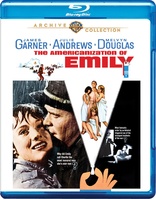
Movie rating
7.1 | / 10 |
Blu-ray rating
| Users | 5.0 | |
| Reviewer | 4.0 | |
| Overall | 4.1 |
Overview
The Americanization of Emily (1964)
Satirical romantic dramedy about a war-time romance between a London widow and an American Navy officer who specializes in procuring hard-to-find luxury goods for a top U.S. admiral. As D-Day approaches, the relationship encounters unlikely obstacles.
Starring: James Garner, Julie Andrews, Melvyn Douglas, James Coburn, Joyce GrenfellDirector: Arthur Hiller
| Romance | 100% |
| War | Insignificant |
| Drama | Insignificant |
| Comedy | Insignificant |
Specifications
Video
Video codec: MPEG-4 AVC
Video resolution: 1080p
Aspect ratio: 1.77:1
Original aspect ratio: 1.85:1
Audio
English: DTS-HD Master Audio 2.0 (48kHz, 24-bit)
Subtitles
English SDH
Discs
50GB Blu-ray Disc
Single disc (1 BD)
Playback
Region free
Review
Rating summary
| Movie | 4.5 | |
| Video | 4.5 | |
| Audio | 3.5 | |
| Extras | 2.5 | |
| Overall | 4.0 |
The Americanization of Emily Blu-ray Movie Review
"Don't Blame It on Our Coca-Cola Bottles"
Reviewed by Michael Reuben March 13, 2014Screenwriter Paddy Chayefsky will probably be best remembered for Network, his brutal satire of TV that seemed over the top in 1976 but was so prescient that today it's almost tame. "People say to me, 'Jesus, you moved into some pretty surreal stuff'", Chayefsky observed, "and I say 'No, I still write realistic stuff. It's the world that's turned into a satire.'" Network won Chayefsky his third Oscar for screenwriting; the other two were for The Hospital (1971) and Marty (1955). He wasn't even nominated for his adaptation of William Bradford Huie's novel, The Americanization of Emily, an oversight that the film's director, Arthur Hiller, considers a grave injustice, because Chayefsky didn't just adapt the novel; he transformed it into something entirely new. Huie, a Naval officer in World War II, had written about the impact of the American arrival on a Britain ravaged by years of privation and German bombardment. In his story, "Americanization" involved the pragmatic suspension of morals as the title character casually slept with U.S. military officers in exchange for fine foods and other luxuries. Chayefsky retained the core premise, but he expanded the story into a darkly comic meditation on war and the various ways in which it is exploited. Chayefsky was no pacifist. He did not attack war with the satiric blunderbuss that Joseph Heller had deployed three years earlier in his novel Catch-22. Chayefsky's target, as usual, was individual hypocrisy and self-deception that collectively made war inevitable and then looked for the best ways to profit from it, in cash or otherwise. At the heart of the story was an impossible romance between a priggish but sentimental Englishwoman and a cynical American officer. Julie Andrews and James Garner played the mismatched couple just after Andrews had completed her work on Mary Poppins. Both actors have repeatedly said that The Americanization of Emily is their favorite of the movies they have made, probably because it is unlike anything else out there.

The brilliance of Chayefsky's script is to give the notion of "Americanization" several possible meanings, which alternate and clash and sometimes change places before your eyes. All of them are dramatized through characters, their actions and distinctively literate dialogue. The first and most obvious meaning is the pragmatic wheeling and dealing of Lt. Commander Charlie Madison (Garner), known as a "dog-robber" in military slang, whose job is to keep his superior, Rear Admiral William Jessup (Melvyn Douglas), well supplied with whatever he desires: booze, steaks, chocolates, ice cream, cigars, attractively attired female companionship (Charlie supplies the appropriately feminine wardrobe from high-end sources like Bergdorf Goodman) and even a fourth for bridge, if necessary. It's this last item that prompts Charlie to turn to his assigned British driver, Emily Barham (Andrews), whose disapproval of Charlie's activities radiates from every pore. "You Americans are really enjoying this war, aren't you?" she snaps at Charlie. "Most English families haven't seen that many oranges or eggs in years, but it's just one big Shriner's convention to you Yanks, isn't it?" Still, Emily accepts the invitation to play bridge at the admiral's party. According to her friend and fellow driver, Sheila (Liz Fraser), the menu is too good to miss. But as Emily gets to know Charlie better, she discovers that his flashy "dog-robber" persona arises from a novel outlook on life, one to which Emily is unaccustomed. Her husband, brother, father and several cousins have all died in the war. The home she shares with her mother (Joyce Grenfell) is virtually a family shrine. Charlie, by contrast, announces without hesitation or shame that he is a coward. His tone is reminiscent of Rick's in Casablanca when he identifies his political affiliation as "a drunkard". As Charlie explains in a memorable conversation with Emily and her mother:
It's not war that's insane, you see. It's the morality of it. It's not greed or ambition that makes war: it's goodness. Wars are always fought for the best of reasons: for liberation or manifest destiny. Always against tyranny and always in the interest of humanity. . . . It's not war that's unnatural to us, it's virtue. As long as valor remains a virtue, we shall have soldiers. So, I preach cowardice. Through cowardice, we shall all be saved.Charlie's approach to war might not be suitable for the military's public image, but it's a unique form of Yankee practicality taken to an extreme. Emily finds its irresistible for the simple reason that it's life-affirming. "I don't want any more doomed men", she says. As for Charlie, he is intrigued in equal measure by Emily's initial disapproval and her beauty. Besides, he's a great believer in seizing the day, or what he calls "the now", which as he tells Emily, consists of "you, a home, a country, a world, a universe. In that order." All of this makes for interesting discussion, but Hitler must still be defeated and D-Day is imminent—and not just the Normandy invasion but further military ventures as well. From the senior commanders' point of view (and, of course, from the audience's), the Allied victory is a foregone conclusion, and this allows Chayefsky to slyly develop another form of "Americanization" while Emily and Charlie fall in love. Admiral Jessup is already scheming to ensure both the Navy's post-war survival and generous funding by Congress after the war is won. The Allied supreme commander, Gen. Dwight Eisenhower, would later, as President of the United States, warn against the tendency of the modern military toward self-perpetuation and expansion. (It was Eisenhower who coined the term "military-industrial complex".) Chayefsky smuggles that notion from his own era into this World War II story through the admiral's troubled spirit, which has been unbalanced and adrift since his wife's death. His mind unhinged from sleepless nights, the admiral seizes upon the nutty idea of a having a documentary film crew record the first man to die on Omaha Beach. That man must, of course, be a sailor. No matter what Charlie or the admiral's adjutant, Lt. Commander "Bus" Cummings (James Coburn), does or says, Admiral Jessup cannot be dissuaded from his plan. When word of the PR stunt gets out, it takes on a life of its own. It even has a certain patriotic appeal to proud graduates of the Annapolis Naval Academy like Capt. Harry Spaulding (William Windom). Unfortunately, the logistics are impossible, leading to farcical routines involving movie cameras without film, drunken camera crews with no training and filming at gunpoint. Emily can only look on helplessly while her beloved Charlie is sucked into this absurdist machinery. In Emily's last half hour, events veer from lunatic to tragic and back again. How it ends would be unfair to divulge, but let's just say that every variant of Americanization dramatized in the film gets to say its piece. The Americanization of Emily was the first major feature directed by Arthur Hiller, who would later have major hits with Silver Streak and Love Story. Hiller says in the accompanying commentary that, like Andrews and Garner, Emily is his favorite among his films. Other than the decision to shoot in black-and-white, Hiller didn't impose a distinctive visual signature on the film. He had a great script (a first draft, according to the commentary) and a sterling cast, and he was smart enough to set up the shots, then sit back and let the actors bring the words to life.
The Americanization of Emily Blu-ray Movie, Video Quality 
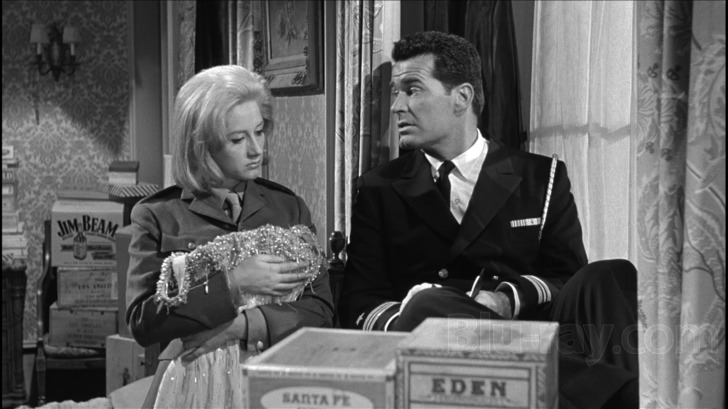
Philip Lathrop's (Earthquake) black-and-white cinematography for The Americanization of Emily was nominated for an Oscar. This 1080p, AVC-encoded Blu-ray from the Warner Archive Collection provides a pleasing recreation of Lathrop's photography, with just one minor issue. The blacks are deep and solid, so that the dark blue Naval uniforms translate as almost jet black, and the night scenes, especially a crucial farewell between Charlie and Emily in the pouring rain, are appropriately framed in deep shadow. Grays and white are finely delineated with nuanced shadings that bring out tiny details in clothing, faces and elaborate sets like Charlie's hotel room—the swankiest shop in London, according to Emily's friend, Sheila—and Emily's traditional English home (which seems to have miraculously survived the blitz). Contrast levels are accurately set to provide depth without overwhelming shadow detail. A fine and natural grain pattern is evident but never obtrusive The only real negative is the occasional (very occasional) intrusion of video noise. It appears and disappears quickly and with no discernible pattern. I can only guess that it's an unavoidable side effect of achieving proper levels of contrast, and that the technical crew chose to leave it rather than risk tampering with what is otherwise a film-like presentation. The above description obviously does not apply to occasional insert shots taken from vintage footage from the invasion of Normandy or the fleet preparing to sail. These are soft, rough and grainy, and they will never look any better. In a striking departure for Warner, the average bitrate clocks in at 30.00 Mbps, which is welcome given the detail and complexity of the images. A lengthy scene of conversation becomes as demanding for bandwidth as an action scene when there is heavy rain falling throughout the frame. Emily's visuals are as complex as its story.
The Americanization of Emily Blu-ray Movie, Audio Quality 
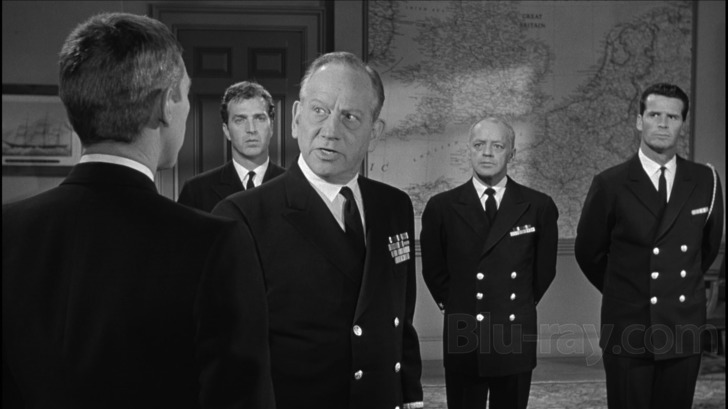
According to IMDb, The Americanization of Emily was released in both mono and stereo. Warner's 2005 DVD listed a stereo track, and the lossless DTS-HD MA 2.0 track on Warner Archive Collection's Blu-ray also has audible stereo separation in Johnny Mandel's (Point Blank, M*A*S*H*) score. Dialogue remains centered and clear (essential for Chayefsky's sophisticated exchanges), and most sound effects also remain in the center. A few key effects spread to the left and right, e.g., the pounding English rain in the scene previously mentioned between Charlie and Emily. (Mandel wrote a title song with lyrics by Johnny Mercer, but Hiller could not find a place to include it in the film. Frank Sinatra recorded it for release the same year as the film.) Note that the Blu-ray's back cover erroneously describes the audio track as Dolby Digital 2.0.
The Americanization of Emily Blu-ray Movie, Special Features and Extras 
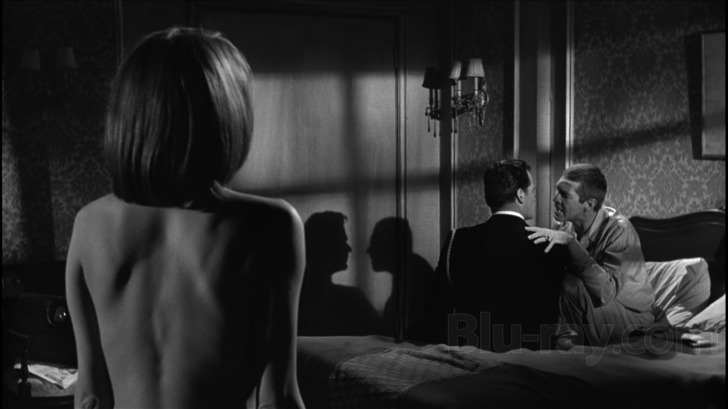
The extras have been ported over from Warner's 2005 DVD of The Americanization of Emily, which mistakenly listed film historian Drew Casper as the commentator.
- Commentary with Director Arthur Hiller: This is obviously a commentary recorded long after the production, because Hiller's memory for details is sketchy, although a few incidents stand out so vividly that he repeats them (e.g., Garner cracking a rib during a major action sequence). The person mentioned most frequently is screenwriter Chayefsky, whom Hiller calls the one true genius he has known. Much of the commentary is devoted to general reflections on the craft of directing. In the last 45 minutes, pauses become lengthier and more frequent.
- Action on the Beach (1080p; 1.33:1; 6:02): This vintage black-and-white featurette documents the recreation of a stretch of Omaha Beach at a California location near Oxnard for a key sequence of the film.
- Theatrical Trailer (1080p; 1.78:1; 2:41): The trailer plays up the film's satirical elements. Three years after the release of Joseph Heller's Catch-22, the MGM marketing department obviously hoped that audiences were ready for a film that also treated World War II with similar irreverence.
The Americanization of Emily Blu-ray Movie, Overall Score and Recommendation 
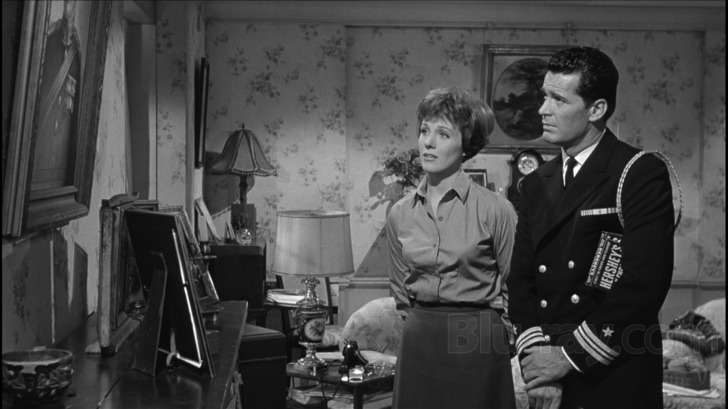
It may be difficult to imagine now, but when it premiered fifty years ago, The Americanization of Emily was controversial for its sexual frankness. In an era when Rob and Laura Petrie on The Dick Van Dyke Show could not be shown sharing the same bed, some viewers were scandalized (and others were turned on) when Charlie and Emily openly discussed the possibility that Emily might get pregnant (thereby confirming that they were doing more than kissing), or when James Coburn's Bus Cummings bedded three different women (the so-called "Nameless Broads"). Times have changed, but the clash of pragmatism vs. principle that simultaneously attracts Emily and Charlie to one another and pushes them apart remains. Highly recommended.
Similar titles
Similar titles you might also like

Hail the Conquering Hero
1944

Catch-22
1970

Last Flag Flying
2017

Men in War
1957

A Walk in the Sun
1945

Ryan's Daughter
1970

Some Came Running
Warner Archive Collection
1958

Whiskey Tango Foxtrot
2016

The Bridges at Toko-Ri
1954

The Best Years of Our Lives
1946

The Perfect Furlough
1958

The Caine Mutiny
1954

The Front Page
1974

The Miracle of Morgan's Creek
1944

Castle Keep
1969

Coming Home
Special Edition
1978

Gardens of Stone
1987

Billy Lynn's Long Halftime Walk
2016

Gallipoli
1981

The Men Who Stare at Goats
2009